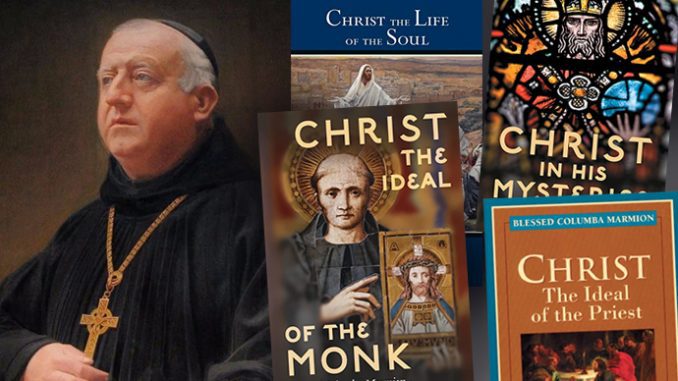This year marks the 100th anniversary of the death of the great spiritual writer Blessed Marmion in January, and his liturgical feast is on October 3rd.
“Tell them that the new Parish Priest with his velvet waist-coat and gold chain, has got inside the poor Benedictine who wears no waist-coat & sports a boot lace for a chain,” Blessed Columba Marmion wrote to his sister shortly after leaving the diocesan priest hood for Benedictine monasticism. Marmion’s humorous joking at himself as a dandy young Parish Priest tuned monk is an iconic portrayal of his character; a deep search for union with God joined to a jovial love of good fun and affectionate friendships.
This year marks the 100th anniversary of the death of Blessed Marmion in January, and his liturgical feast is on October 3rd. An Irish monk and spiritual writer, Marmion was born in 1858 in Dublin to an Irish father and French mother. Marmion entered the minor seminary as a teenager, eventually finishing his studies at the Irish College in Rome. Ordained in 1881, he returned to Ireland to serve as a diocesan priest. For four years he served at a parish Dundrum, taught at Holy Cross College at Clonliffe, and acted as chaplain to a nearby convent.
However, Marmion was not satisfied with his active life as a diocesan priest and eventually obtained permission to enter the Belgian monastery of Maredsous, which he had visited on his way back from Rome. Writing to a priest friend, Vincent Dwyer, Marmion commented on the loneliness of the diocesan priest:
The life of a priest is very much more lonely than we anticipate. I have often been for days without opening my lips to a mortal. This may seem very strange but it is true, & if we can’t find our pleasure before Gesu sacramentato [an Italian phrase for Jesus in the Eucharist], we will, inevitably, go for consolation into society & then…
Marmion’s unfinished sentence has been sadly completed in our own day with various clerical sins and scandals. Marmion didn’t see a “social life” as wrong: there simply had to be a much deeper motivation and source of strength for a priest. “It is quite a different thing to dine out occasionally with a good intention and to go into society because one can’t bear to be alone,” Marmion continues.1
The correspondence with Dwyer bounced from serious spiritual considerations like those above to jocular and teasing ones: “You are looking well & fat; your head taking the shape of the mitre” he wrote to Dwyer, who was then a missionary in Australia. Prophetically (and perhaps predictably), Dwyer did indeed become a bishop. After entering the monastery, Marmion hells Dwyer musn’t think that a monk is “dried up”, so wrapt in prayer that “he forgets his friends.” “Dear Vincy, let us grow in personal love for Jesus. It is the great joy of this life, & source of durable peace.”
Marmion was famous in his day for his humor and humanity, but entering Benedictine monasticism in the last decades of the Victorian era brought him into contact with a rather stiff and cold spirit—he was frequently corrected for not having a sufficiently tidy habit.2 The monks did not know quite what to make of Marmion’s Irish humor, warmth, and common sense. These traits, of course, made him beloved, especially to his lay spiritual directees.
Already a priest, Marmion was quickly given various responsibilities. He was eventually appointed a theology professor at Maredous’ house of formation, Mont Cesar, where he also served as Prior. In 1909, however, Marmion was elected third abbot of Maredsous. This was no small responsibility: consisting of over a hundred monks, Maredsous Abbey ran two schools and published an esteemed scholarly journal, La Revue bénédictine. Marmion took as his abbatial motto a phrase from St Benedict’s rule on what the role of the abbot should be: Magis prodesse quam praesse, “To serve rather than be served.”
As Abbot, Marmion had to lead the monastery through World War I. In the middle of war torn Belgium, he evacuated many of his young monks to Ireland to protect them from the draft: this involved many adventures, including Marmion traveling disguised as a cattle merchant without papers. Despite his best efforts however, he came under serious criticism from his monks for imprecise financial dealings while trying to establish the monastic refuge in Ireland. Perhaps the older monks left in Belgium felt neglected; the wartime postal service also made communication extremely difficult, only adding to the miscommunications. Exonerated, he was nonetheless deeply wounded by the disobedience and troublemaking that several of his monks caused him over his attempt at providing in difficult circumstances.
Over the course of his time both as a simple monk and Abbot, Marmion became famous in the British Isles and central Europe for his retreat conferences. These were eventually published in the form of four books. Recent years have seen the republication of these important books, with Angelico Press republishing Christ the Life of the Soul, and the Cenacle Press at the Benedictine monastery of Silverstream producing two beautiful centenary editions of Christ the Ideal of the Monk, Marmion’s monastic treatise, and his commentary on the liturgical year, Christ in His Mysteries. Ignatius Press has republished Christ the Ideal of the Priest, which stresses how the priestly life must be dependent upon Christ’s merits, His grace, and His activity in the soul of the priest.
A major emphasis in these books is the Christian soul’s adoption in Christ as a son of the Father, which has given rise to a hope that he will one day be declared the “doctor of Divine adoption.”
Based on his notes for retreat conferences, these books were edited by Marmion’s secretary, Dom Raymond Thibaut, and published in French, the language spoken at Maredous and in which Marmion had become fluent. Unfortunately, Thibout’s idea of what was “pious,” sounding lead him to “sterilize” the anecdotal and humorous style of Marmion into what he thought a Abbot “should” sound like. Phrases like this one, preserved in the English letters of his youth, didn’t make the cut: “I have to instruct a large congregation of antiquated virginity this evening,” he wrote to a friend regarding his duties at a nearby convent. Apparently novices sometimes had to leave the chapter room in fits of laughter when their abbot preached!
In his day, these books were wildly popular, translated into dozens of languages. Today, those who prefer a less old fashioned style of spiritual writing might enjoy his letters of spiritual direction most, as they are slightly less formal and include a number of letters originally in English: the collection, entitled Union With God, was beloved by St Theresa of Calcutta (among others), and has gone through numerous editions over the past 80 years. Many of his letters are to laity, including mothers and teenagers. Marmion’s spiritual doctrine is not unlike that of St Therese in some ways. Listen to what he has to say about “littleness”:
The ways of God are entirely different from our ways. To us it seems necessary to employ powerful means in order to produce great effects. This is not God’s method; quite the contrary. He likes to choose the weakest instruments that He may confound the strong: “God chose what is weak in the world to shame the strong.”
Several anthologies have also been made available again, most notably the Cenacle Press’s beautiful leather bound edition of Words of Life. This book collects quotations from Marmion’s books and arranges them according the traditional liturgical calendar, with excerpts for various feast days or liturgical seasons.
My favorite collection, however, is The English letters of Abbot Marmion, unfortunately not available in any good edition currently. One of the funniest aspects are Marmion’s prolific yet unconscious abbreviations, for example, when Marmion gives his very sick brother the “last sacs”. In another place he comments that “all the water in the ocean couldn’t baptise Kant”.
While these letters do balance the perception of Marmion created by his early official biographies and formalized books, the imbalances of his day are still present. The spiritual climate of the early 20th century put a great emphasis on obedience to and trust of one’s spiritual director. This is evident both in the way Marmion approached his own superiors and how he wrote to his directees, revealing an approach that ought to have had greater nuance and given more room for responsibility, knowledge, and freedom in the directee. Marmion himself—at least at the end of his life—also recognized this. “I hate what is commonly known as direction, and directors…there is often very little of God, and a lot of ourselves in it.”3
We should take note of Marmion because of his historical importance in spiritual direction; he is one of the few modern Irish saints; and he is an encouraging example of a Saint presented as “prim and proper” who nonetheless was in fact very human. He reminds us that secular priests have a hard job and that for those considering religious life, monasticism may provide a healthier setting.
Endnotes:
1 The English letters of Abbot Marmion (Baltimore, Helicon Press 1962), p. 15.
2 Ibid., p. 58.
3 Ibid., p. 219.
–This piece originally appeared in The Dispatch at Catholic World Report on September 28, 2023
Image Source: Wikipedia



